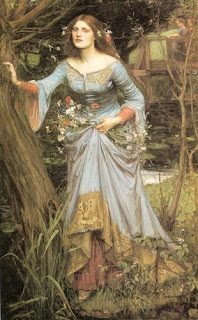 |
| Statue of Hamlet from the monument to William Shakespeare, Stratford-Upon-Avon source Wiki |
Hamlet ~~ Act III Scene I
Claudius and Gertrude cross-examine Guildenstern and
Rosencrantz as to Hamlet’s state of mind.
Claudius senses a purpose in Hamlet’s mad responses and the friends
somewhat confirm his suspicion.
The king and queen are delighted that Hamlet has taken interest in the
players, unaware of his duplicitous plot.
When Rosencrantz and Guildenstern take their leave, Claudius reveals that he is plotting with Polonius to
spy on Hamlet & Ophelia to see if his madness has sprung from his love of
her, or if there is another possibility.
Polonius gives Ophelia what appears to be a prayer book, so she looks
natural, then muses how often pious actions cover up devious intentions. His words stir up Claudius’ guilt. They hide and Hamlet enters, delivering
the most famous speech in the play:
To be or not to be?
That is the question ---
Whether ‘tis nobler in the mind to suffer
The slings and arrows of outrageous fortune,
Or to take arms against a sea of troubles,
And, by opposing, end them? To die, to sleep ---
No more --- and by a sleep to say we end
The heartache and the thousand natural shocks
That flesh is heir to --- ‘tis a consummation
Devoutly to be wished!
To die, to sleep.
To sleep, perchance to dream --- ay, there’s the rub,
For in that sleep of death what dreams may come
When we have shuffled off this mortal coil,
Must give us pause.
There’s the respect
That makes calamity of so long life
For who would bear the whips and scorns of time,
Th' oppressor's wrong, the proud man's contumely,
the pangs of despised love, the law's delay,
The insolence of office, and the spurns
That patient merit of th' unworthy takes,
When he himself might his quietus make
With a bare bodkin? Who would fardels bear,
To grunt and sweat under a weary life,
But that the dread of something after death,
The undiscovered country from whose bourn
No traveler returns, puzzles the will
And makes us rather bear those ills we have
Than fly to others that we know not of?
Thus conscience does make cowards of us all,
And thus the native hue of resolution
Is sicklied o'er with the pale cast of thought,
And enterprises of great pith and moment
With this regards their currents turn awry,
And lose the name of action. ---- Soft you, now,
The fair Ophelia! ---- Nymph, in thy orisons
Be all my sins remembered."
Ophelia reveals that she has mementos of Hamlet's to return, but Hamlet
claims that he has no memory of them.
His words become harsh to her as he tells her he didn’t love her and, since all men are knaves, become entangled with none. He entreats her to go to a nunnery, since her womanly form
and wiles only will cause complications for all.
When Hamlet exits, Ophelia laments his state of mind, and the contrast of his
previous self to this madman, which, in her, stirs regretful emotion.
Claudius, with clear insight, concludes Hamlet is not mad
for love, but that his actions spring from unknown intent that could be dangerous,
therefore, he decides to send him far away to England. Polonius, however, still believes that Hamlet
is lovestruck, and suggests that Gertrude attempt to discover the truth from
him.
 |
| Hamlet - the "play-with-a-play" (19th century) Pascal Adolphe & Jean Dagnan-Bourvet source Wiki |
Thoughts:
 |
| Ophelia (1910) John William Waterhouse source Wikiart |
We now have Ophelia reading a book, once again bringing the theme of words again into the play.
While Hamlet’s “lunacy” has appeared rather benign and
sometimes silly, Claudius has come to the conclusion that it is dangerous,
evidence that he believes that it is cloaking another intent. While (in the last scene) Hamlet
is preparing to set a trap for Claudius, Claudius now sets a trap for Hamlet by
spying on him. Part of Claudius’
suspicions of Hamlet, appear to stem from his own guilt. When Polonius remarks that people who appear good can act
badly, Claudius agonizes:
“
Oh, ‘tis too true!
How smart a lash that speech doth give my conscience!
The harlot’s cheek, beautied with plastering art,
Is not more ugly to the thing that helps it
Than is my deed to my most painted word.
O heavy burden!”
So both Hamlet and Claudius have set or are setting traps,
and both have guilt and are struggling with their consciences.
Hamlet’s “To Be” speech is electrifying. The fear of death keeps people in a
life of drudgery and toil and prevents him from commiting suicide. The unknown is more fearful than the known. Again he mentions
conscience.
Hamlet’s words to Ophelia seem severe and hurtful, but one
must remember that Hamlet is so encased in his troubles that Ophelia, being a woman, is, in effect, Gertrude to him, and he has transposed all his mother's perceived wicked
qualities to this young woman.
 |
| Hamlet and Ophelia (1883) Mikhail Vrubel source Wikiart |
Hamlet Read-Along Posts
Act III Scene I
No comments:
Post a Comment